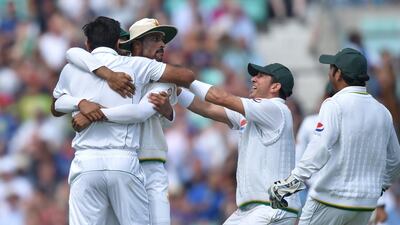DUBAI // Plans to introduce two divisions into Test cricket have been withdrawn after a two-day meeting between the chief executives of Full Members in Dubai.
That always looked to be the likely scenario once the Board of Control for Cricket in India (BCCI) had expressed its objections to the idea before the meeting, an idea that was first publicly proposed by the International Cricket Council's chief executive David Richardson in June but has been under discussion since October last year.
• ICC meeting: Two-division Test cricket, TV rights among big changes on the table
An official confirmed to The National that the two-tier plans have been "shelved" for now. "The two-tier plan is off the table because quite a few countries had issues with the model," he said.
The BCCI was not alone in not being convinced by those boards in favour of the plans, namely Australia, England, Pakistan, South Africa and New Zealand. They were joined by Bangladesh, Sri Lanka, Zimbabwe as well as the West Indies.
Bangladesh had been one of the most vocal objectors to a model, which, initially at least, would have seen them in the second division without a chance to play the top sides.
“We are delighted we could convince other members of the negative impact it would have on Bangladesh cricket,” Nizamuddin Chowdhury, the Bangladesh Cricket Board’s chief executive, said. “I thank them for understanding our situation.”
The boards did, however, discuss a “compromise” option that would still see the number of Test-playing countries increase and what the ICC called “a Test Championship play off” every two years.
An official who attended the meetings expanded on this proposal and said that two Associate nations would still get the chance to play Test cricket and be involved in some kind of league structure that would culminate every two years in a play-off between the top two-ranked sides to determine a Test champion.
All chief executives were said to be in broad agreement on these two basic principles of any new model: of finding a Test champion and including two Associate sides to play Tests.
But these ideas will first have to be presented by those who attended to their respective boards, before the matter is taken forward at the next ICC board meeting, next month in Cape Town. Only then will details begin to emerge of the precise nature of such a model.
There were further discussions on plans for a rolling three-year league for one-day internationals and Twenty20s with 13 teams; one possibility is of restricting each side to six home and away games a year that count towards any such league.
Even here, however, full consensus is absent with one official admitting: “A lot of work still has to happen for this to become a reality.”
One of the more intriguing developments from the meeting, however, centres around a collective TV rights pool. This was an idea under discussion in the build-up to the meeting, that in any new structure members would pool the money from the overseas rights of their bilateral series (while retaining the home market rights) in a central pool that would then be redistributed equally to all members.
The BCCI had reportedly expressed an objection to it beforehand and if so, it would be understandable, given they are the board that commands the most lucrative TV rights.
During the meeting, however, several boards agreed to work on setting up a central pool that the BCCI need not join and which would be optional to join for those who want to.
It is believed that Australia, England, South Africa, Pakistan and New Zealand have, in theory, agreed to pool their overseas TV rights in a new model. If that does go ahead it is likely to have repercussions for the economy of the sport as whole, currently dominated as it is by the Indian market.
Follow us on Twitter @NatSportUAE
Like us on Facebook at facebook.com/TheNationalSport

